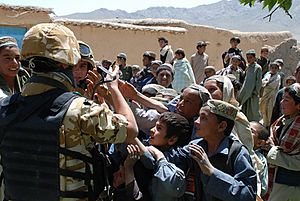Generosity facts for kids
Generosity is when you are kind and willing to give to others. This often means sharing your time, money, or talents. It's about giving without expecting anything back. Many cultures and religions around the world see generosity as a very good quality.
Generosity is often linked to charity. Charity means giving help to people who need it. This can be giving your time, things you own, or your skills. For example, after a natural disaster, people often give food, money, or help to those affected.
When people give generously, they often feel happy and satisfied. This is why generosity is a main idea for many charity groups and non-profit organizations.
Contents
Where the Word "Generosity" Comes From
The word generosity comes from the Latin word generōsus. This word meant "of noble birth" or "from a good family." It came into English through an Old French word, généreux.
Hundreds of years ago, in English, generosity mostly described people from noble families. To be generous meant you were acting like a noble person.
During the 1600s, the meaning started to change. Generosity began to mean a "nobility of spirit." This was about good personal qualities, not just family background. It started to mean being brave, strong, kind, or fair. The word was also used to describe things like fertile land or strong drinks.
By the 1700s, generosity started to mean what it mostly means today. It became about being open-handed and giving money or things to others. This meaning became very common by the 1800s.

Generosity in Religions
Many religions teach about the importance of being generous.
Buddhism
In Buddhism, generosity is one of the Ten Perfections. It is seen as a way to fight against greed. In Eastern religious texts, generosity is called dāna.
Islam
In Islam, the Quran teaches that God will replace whatever you give away generously. This is if you give with the intention of pleasing God. The Quran says: "Truly, my Lord enlarges the provision for whom He wills of His slaves, and also restricts it for him, and whatsoever you spend of anything (in God’s Cause), He will replace it. And He is the Best of providers."
Christianity
In Christianity, the Acts of the Apostles mentions that Jesus said it is better to give than to receive. While this specific saying is not in the gospels, the idea of giving is very important. In his first letter to Timothy, Paul tells rich Christians to be "generous and willing to share." Later Christian teachings further developed the idea of charity as a virtue, meaning a type of love that involves giving.
Generosity and Science
Scientists have studied generosity to understand how it works.
Brain Chemistry
Some research looks at how brain chemicals might affect generosity. For example, a chemical called oxytocin has been studied. In one experiment, men were given oxytocin or a fake medicine. They then played games involving sharing money. In one game, called the Ultimatum Game, oxytocin made people more generous. They offered more money to others, showing they thought about the other person's feelings.
Income and Giving
Studies have also looked at how income relates to generosity. Some research suggests that people with higher incomes might be less generous than those with lower incomes. Also, if people feel there is a lot of economic inequality (big differences in wealth), higher-income people might be less generous.
How Generosity Spreads
Researchers have also studied how generosity can spread from person to person. This is like a "social contagion." If you see others being generous, you might be more likely to be generous too. This can happen through:
- Generalized reciprocity: This means you give to someone, hoping that someone else will give to you in the future.
- Observing others: Just seeing other people act generously can make you want to do the same.
However, sometimes seeing many people around can also lead to the bystander effect. This is when people are less likely to help if there are many others present, because they think someone else will do it.

See also
 In Spanish: Generosidad para niños
In Spanish: Generosidad para niños
- Altruism
- Dāna
- Kindness
- Philanthropy
- Selfless service
 | George Robert Carruthers |
 | Patricia Bath |
 | Jan Ernst Matzeliger |
 | Alexander Miles |


